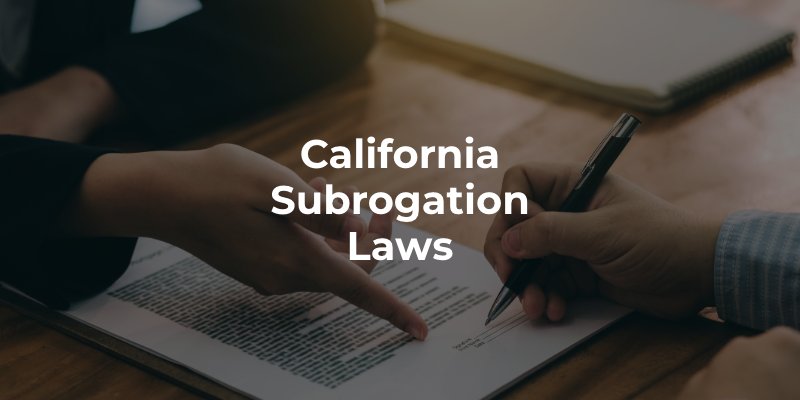Our attorneys have been assisting the Orange County and Southern California communities for over 40 years.
Subrogation is an insurance term you may encounter after a personal injury accident in California.
Subrogation is an action your insurance company can take to recover the amount it gave you to cover your medical expenses. The insurer will not request a subrogation payment from you, but rather from the party that caused your accident.
Since your insurance company was not liable for your injuries, it has the right to seek compensation from the party that caused them. A subrogation payment will come from a compensatory damage award you receive from the at-fault party during a personal injury claim.

Even a simple or straightforward insurance settlement after an accident can take around three months to complete. Many cases are much longer, with personal injury trials taking a year or more on average. An accident victim will need medical care long before the completion of an insurance claim or injury lawsuit. In these situations, the injured party’s insurance company may pay for the victim’s medical treatments up front, then file a subrogation claim with the defendant in the future for reimbursement.
California’s subrogation law gives insurance companies the right to seek reimbursement from the at-fault party for the amounts they spend on a claimant’s damages. The subrogation law holds that since the insurance company did not cause the accident, it should not be legally responsible for paying a victim’s damages.
While most insurers will cover the immediate costs for the benefit of the policyholder, including medical bills and property repairs, they will have the right to seek subrogation later. After a successful case resolution, the insurance company generally expects repayment.
Subrogation applies when someone other than the policyholder is responsible for an accident. If the policyholder is at fault, the insurance company cannot pursue subrogation and must cover the damages under the terms of the policy.
However, if another party is liable, the insurer has the right to seek reimbursement for what it paid on behalf of the policyholder. This typically includes medical expenses, property damage repairs, lost wages, and other costs. Rather than collecting directly from the policyholder, the insurance company will recover these costs from the at-fault party’s insurance or a settlement.
More than one insurance company may have the right to request subrogation, depending on the circumstances. Because subrogation affects how compensation is distributed, it’s important for accident victims to understand how it may impact their final settlement or verdict.
Because subrogation involves legal claims, there are specific deadlines that insurance companies must follow when seeking reimbursement.
If an insurance company has the right to seek subrogation pay, it will have three years from the date of the accident to file a claim, in most cases.
However, for claims related to personal injuries, the general statute of limitations in California is two years. The specific timeline for subrogation can depend on contractual agreements between you and your insurer. If you’re unsure how subrogation may impact your settlement, consulting a personal injury attorney can help ensure you meet all deadlines and protect your right to fair compensation.
Although an insurance company has the legal right to request subrogation payments, the “Made Whole Doctrine” prevents the insurer from claiming 100% of your settlement or judgment award. An insurance company must give you the first opportunity for reimbursement as the accident victim. The compensation award must make you whole or give you enough to cover your damages before an insurer can receive any money in subrogation.
Note, however, that an insurance contract may have language that overrides the Made Whole Doctrine.
Other rules, such as the Common Fund Doctrine, may also limit an insurance company’s ability to obtain reimbursement. This law makes insurance companies give some money to the accident victim’s lawyer if the insurance company did not hire its own attorney to handle the subrogation. This doctrine can motivate your attorney to negotiate insurance subrogation.
An experienced car accident attorney could help you understand the state’s subrogation law and how to handle this aspect of your claim after a serious personal injury in California.